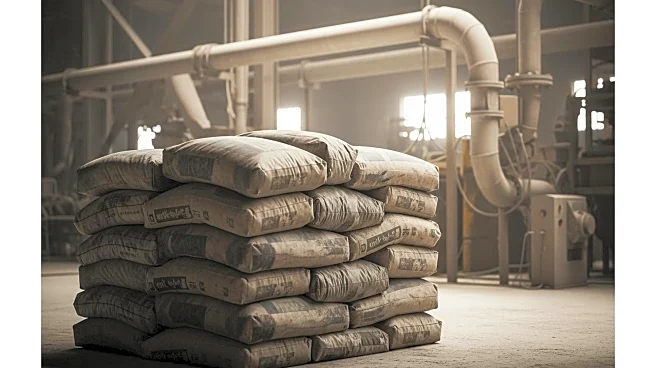What is the story about?
What's Happening?
The UK cement industry is experiencing a significant downturn, with production levels dropping to 7.3 million tonnes in 2024, marking the lowest output since 1950. This decline is attributed to high energy, regulatory, and labor costs, as reported by the Mineral Products Association (MPA). The reduction in cement production is part of a broader downturn in the construction materials sector, affecting ready-mixed concrete sales and other mineral products. The MPA has expressed concerns that this decline could hinder the UK government's infrastructure and housing projects, such as the Sizewell C nuclear power station and the New Hospitals Programme, which rely heavily on cement.
Why It's Important?
The decline in cement production poses a significant risk to the UK's construction industry, which is crucial for meeting the government's infrastructure and housing targets. The increased reliance on imported cement, which has risen from 12% of sales in 2008 to 32% in 2024, makes the supply chain vulnerable to international market fluctuations. The MPA is urging the government to implement measures to support domestic production, such as reducing industrial energy prices and advancing carbon capture technologies. Failure to address these issues could lead to job losses in manufacturing and hinder economic growth.
What's Next?
The UK government plans to introduce a Carbon Border Adjustment Mechanism (CBAM) by 2027 to level the playing field between domestic and imported materials. The MPA is calling for robust enforcement of this system and procurement policies that favor domestic producers. Additionally, the trade body is advocating for reforms to lower industrial energy costs and support for carbon capture technologies to sustain the cement industry.
Beyond the Headlines
The decline in cement production highlights broader challenges in the UK's industrial sector, including the impact of high energy costs and regulatory pressures. The situation underscores the need for strategic policy interventions to ensure the sustainability of key industries and protect jobs. The focus on carbon capture technologies also reflects the growing importance of environmental considerations in industrial policy.
















